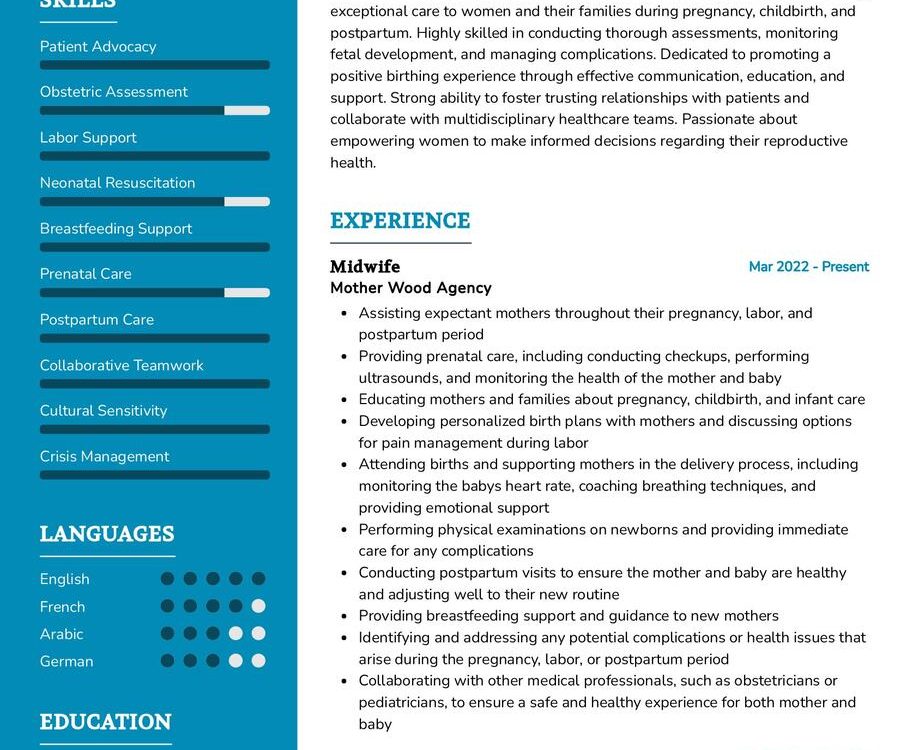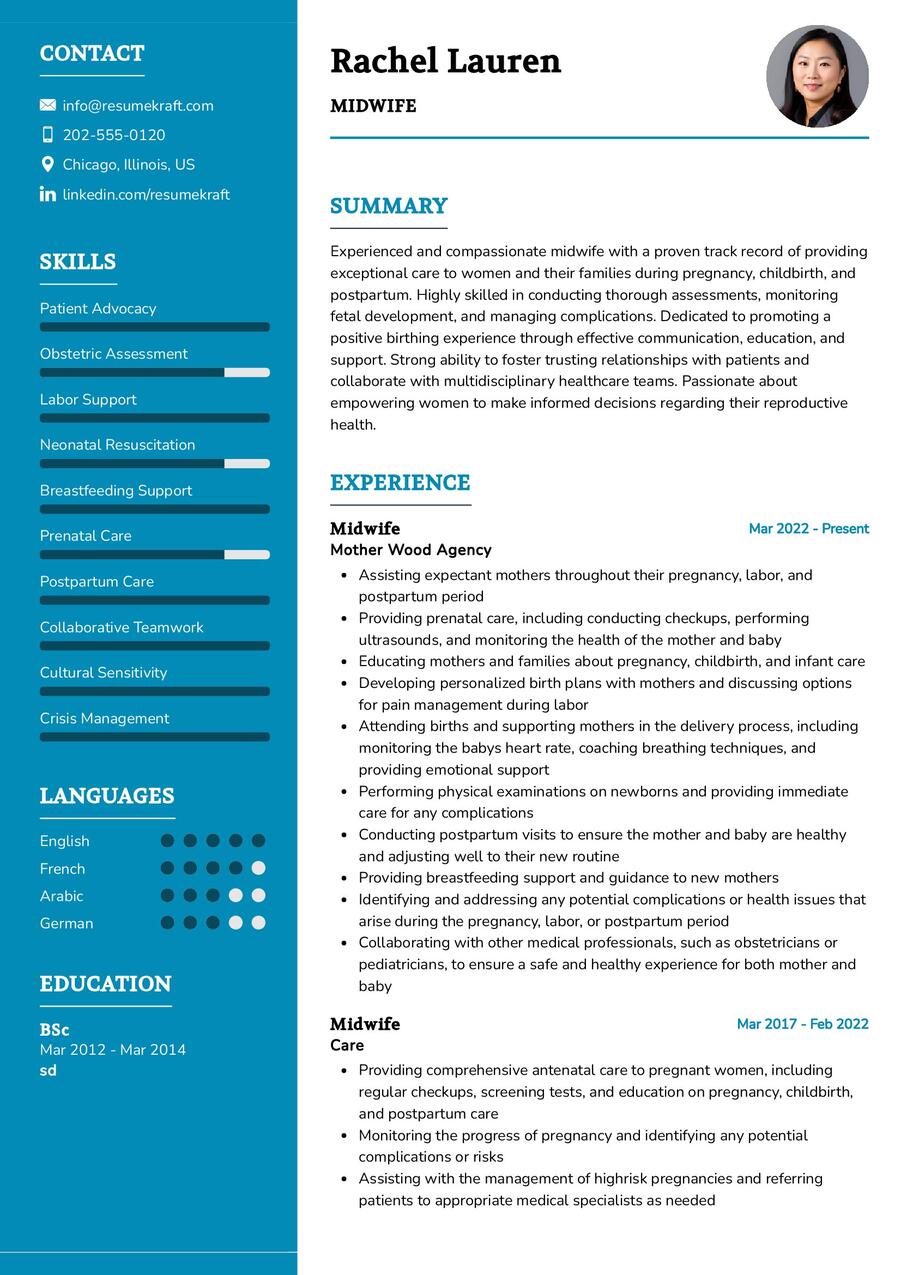Exploring the Vital Role of a Midwife
Amid the dynamic landscape of healthcare, the role of a Midwife stands as a beacon of support for expectant mothers, guiding them through the profound journey of childbirth. In this article, we will delve into the multifaceted responsibilities, essential skills, and educational requirements that define the role of a Midwife, a profession deeply rooted in compassion and expertise.
Midwife Job Requirements: Nurturing the Birth of a Career
Embarking on the path of becoming a Midwife involves meeting specific requirements that pave the way for a rewarding and impactful career. Let’s explore the prerequisites needed to embrace the role of a Midwife:
- A Bachelor’s or Master’s degree in Nursing or Midwifery, laying the foundation for comprehensive healthcare knowledge.
- In-depth understanding of prenatal and postnatal care, showcasing expertise in guiding mothers through the childbirth process.
- Certification from accredited midwifery programs, validating the skills and knowledge acquired in the field.
- Excellent communication and interpersonal skills, crucial for building trust and providing emotional support to expectant mothers.
- Adaptability and resilience, traits developed through experiences in diverse healthcare settings.
- Hands-on clinical experience in midwifery, reflecting a practical application of theoretical knowledge.
Additional certifications in specialized areas, such as lactation consulting or neonatal care, can further enhance your profile in the competitive field of midwifery.
Responsibilities of a Midwife: Navigating the Path to Safe Deliveries
The role of a Midwife is a tapestry of responsibilities, intertwining technical expertise with compassionate care. Let’s unravel the core duties that define this crucial role:
- Providing personalized prenatal care, including health assessments and education for expectant mothers.
- Assisting in labor and childbirth, ensuring a safe and supportive environment for both mother and baby.
- Monitoring the health of the newborn and providing postnatal care to promote a smooth transition for the family.
- Offering guidance on breastfeeding, nutrition, and postpartum well-being to new mothers.
- Collaborating with other healthcare professionals, such as obstetricians and pediatricians, to ensure comprehensive care.
- Advocating for the rights and choices of expectant mothers, fostering a respectful and empowering birthing experience.
- Staying updated on the latest developments in midwifery practices, contributing to continuous improvement in patient care.
Each responsibility is a thread in the fabric of maternal care, weaving a narrative of support, expertise, and compassion.
Crafting a Standout Midwife Resume: A Journey of Expertise and Compassion
Your Midwife resume is more than a document; it’s a reflection of your commitment to maternal health and compassionate care. Here are some tips to create a resume that stands out in the competitive healthcare landscape:
- Highlight your hands-on experience in delivering personalized prenatal and postnatal care.
- Showcase instances where your guidance resulted in positive birthing experiences for mothers under your care.
- Include metrics, such as the number of successful deliveries or patient satisfaction rates, to quantify your impact.
- List relevant certifications, demonstrating your commitment to ongoing professional development.
- Personalize your resume for specific job applications, emphasizing the skills and experiences most relevant to the position.
Your resume is a canvas where you paint your journey as a Midwife, showcasing the impact you’ve had on the lives of mothers and newborns.
Midwife Resume Summary Examples: Capturing the Essence of Expertise
Your resume summary serves as the opening act of your career story, encapsulating your experiences, skills, and the value you bring to the healthcare team. Here are some examples to inspire you:
- “Dedicated Midwife with over a decade of experience, ensuring safe and empowering birthing experiences for countless mothers.”
- “Compassionate and skilled Midwife specializing in high-risk pregnancies, adept at providing personalized care and support.”
- “Experienced and empathetic Midwife committed to advancing maternal health, with a proven track record of successful deliveries and satisfied families.”
Each summary is a window into your expertise, offering a glimpse of the impact you’ve made in the field of midwifery.
Experience Section: Narrating Tales of Compassionate Care
Your experience section is the heart of your resume, pulsating with stories of maternal care and childbirth experiences. Here are examples to guide you in highlighting your journey as a Midwife:
- “Led a team in a busy maternity ward, overseeing a 15% increase in successful natural deliveries over two years.”
- “Provided specialized care for high-risk pregnancies, collaborating with medical teams to ensure optimal outcomes for both mother and baby.”
- “Established and facilitated prenatal education programs, contributing to increased awareness and informed decision-making among expectant mothers.”
Each experience is a chapter in your career book, telling tales of challenges met, solutions found, and the joy of bringing new life into the world.
Education Section: Building a Foundation of Knowledge
Your educational journey is the cornerstone of your career. Showcase your academic achievements and commitment to learning in your Midwife resume:
- Master of Science in Nursing with a specialization in Midwifery, XYZ University, a journey of in-depth learning and expertise, 2010.
- Bachelor of Science in Nursing, ABC University, the foundation of your healthcare career, 2007.
- Certified Nurse-Midwife (CNM) from the American Midwifery Certification Board, a recognition of your specialized skills in midwifery, 2012.
Each educational qualification is a stepping stone, reinforcing your knowledge and expertise in the field of maternal healthcare.
Midwife Skills: Your Toolbox for Maternal Health
Your skill set is a toolbox equipped with a diverse range of tools honed over the years. Let’s list down the essential skills that a Midwife should possess:
Soft Skills:
- Compassion and empathy, the ability to connect with and support expectant mothers emotionally.
- Effective communication, crucial for building trust and maintaining open dialogue with patients and healthcare teams.
- Adaptability, the flexibility to navigate diverse birthing scenarios and provide personalized care accordingly.
- Advocacy, the commitment to promoting the rights and choices of expectant mothers within the healthcare system.
- Team collaboration, working seamlessly with other healthcare professionals to ensure comprehensive care for patients.
Hard Skills:
- Knowledge of obstetrics and gynecology, a deep understanding of the physiological and anatomical aspects of pregnancy and childbirth.
- Competence in administering prenatal tests and screenings, ensuring the health and well-being of both mother and baby.
- Proficiency in neonatal care, essential for addressing the immediate needs of newborns after delivery.
- Experience in managing high-risk pregnancies, providing specialized care for mothers with complex medical conditions.
- Fluency in electronic health record (EHR) systems, ensuring accurate and comprehensive documentation of patient care.
Each skill is a tool, aiding you in providing exceptional care and supporting mothers through the transformative journey of childbirth.
Common Mistakes to Avoid in Your Midwife Resume: Navigating the Path to Success
As you craft your Midwife resume, it’s essential to steer clear of common pitfalls that can impact your chances of landing the ideal position. Here are some mistakes to avoid:
- Using generic language, a strategy that fails to showcase your unique approach to maternal care.
- Overlooking the inclusion of metrics, missing an opportunity to quantify the impact of your care on patient outcomes.
- Neglecting the importance of a personalized cover letter, a valuable tool to communicate your passion for midwifery.
- Overloading your resume with technical jargon, potentially alienating those not familiar with medical terminology.
- Skipping the proofreading process, an oversight that can affect the professionalism of your resume.
Avoid these mistakes to craft a Midwife resume that authentically represents your skills and experiences, setting you on the path to success.
Key Takeaways for Your Midwife Resume: Crafting a Tale of Compassionate Expertise
As we conclude this comprehensive guide to creating a standout Midwife resume, let’s recap the key points to keep in mind:
- Emphasize your hands-on experience and success stories in providing personalized maternal care.
- Showcase your technical expertise in obstetrics, neonatal care, and high-risk pregnancy management.
- Quantify your impact with metrics, illustrating the positive outcomes of your compassionate care.
- Include a section on continuous professional development, highlighting relevant certifications and ongoing education.
Finally, feel free to utilize resources like AI Resume Builder, Resume Design, Resume Samples, Resume Examples, Resume Skills, Resume Help, Resume Synonyms, and Job Responsibilities to create a standout application and prepare for the Midwife job interview questions.
Armed with these insights and tips, you are now ready to craft a Midwife resume that is a true reflection of your journey, your skills, and your dedication to the well-being of mothers and newborns. Best of luck!


